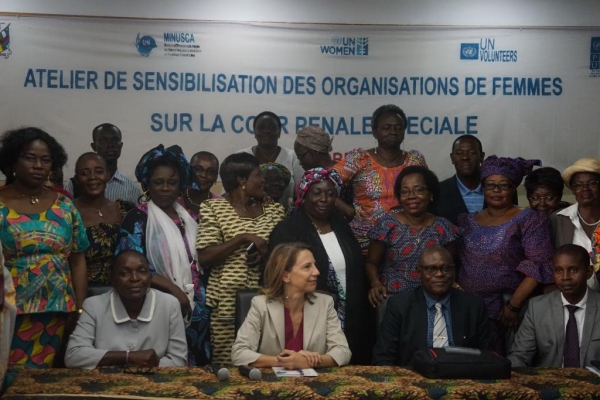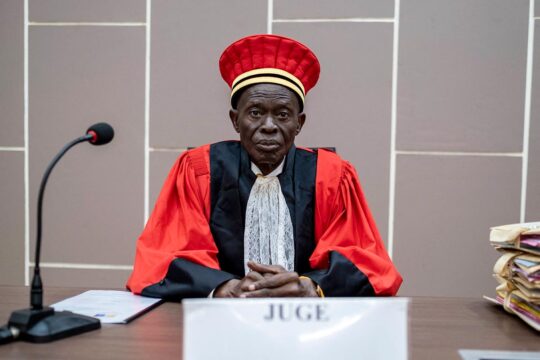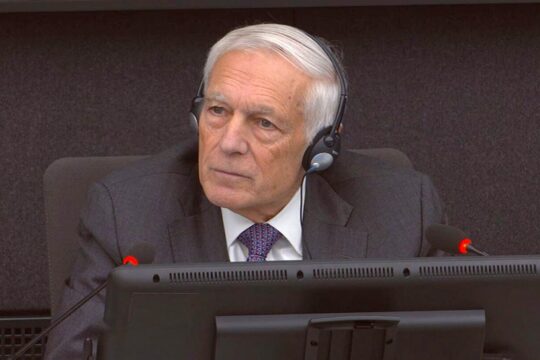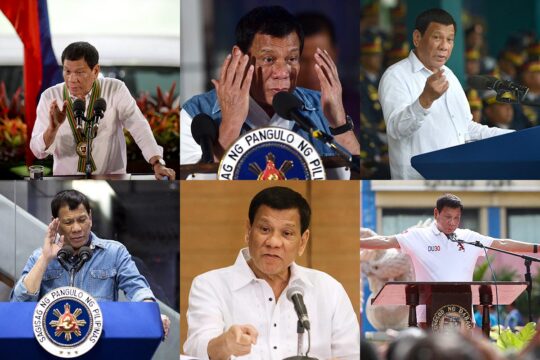In a report on the Central African Republic (CAR) published on May 18, Human Rights Watch (HRW) calls for more political and financial support to the Special Criminal Court (SCC), which is being set up to try serious crimes committed in the country since 2003. The report, which comes as the CAR is experiencing a new upsurge of violence including in the capital Bangui, looks at the progress, obstacles and challenges for the Special Criminal Court in its initial phases. JusticeInfo.Net talked to Elise Keppler, associate director of the International Justice Programme at Human Rights Watch.
JusticeInfo: Why have donors been slow to provide funds for the SCC to start its work?
Elise Keppler: The Special Criminal Court fortunately has had funding to begin its operations. The problem is continuing to have sufficient resources to operate going forward. The challenge is not unique to the Special Criminal Court. We have seen a trend in international justice for funding to be based on voluntary contributions as opposed to assessed dues by UN member states. The Special Court for Sierra Leone and the Extraordinary Chambers in the Courts of Cambodia also have relied on voluntary contributions. But it creates major challenges for a court to function and court officials can end up having to fundraise constantly when they should be able to focus more exclusively on investigations, prosecutions and administering a court.
I have been struck how firm and unequivocal the demand for justice for past crimes in order to break cycles of violence with impunity in the Central African Republic is. It is our hope that this report will help highlight how important the Special Criminal Court’s work is for donors, and that they will step forward to provide continuous, sufficient funding for this court.
Does the CAR government really want to see this Court working? Aren’t there some people within its ranks who should be prosecuted by the SCC?
Central African Republic authorities have consistently affirmed their commitment to the Special Criminal Court, but it will be important that they show this commitment in action over time, such as by encouraging the swift adoption of the rules of procedure and evidence of the court by parliament, following through on their offer to allocate housing for the domestic judges and their families who work at the court to foster adequate security for them, and being available to address without delay any additional recruitment of court staff or other administrative issues that may arise. The court’s operationalization got off to a very slow start. Momentum has picked up in the past eighteen months with many appointments and the commencement of work out of a make-shift premises. That momentum needs to be continued and supported by the Central African Republic authorities. As for investigation and prosecutions of specific individuals, that will be a matter for the special prosecutor of the Special Criminal Court to determine.
Is it possible for the SCC to start its investigations with the current levels of insecurity?
There is no question that adequate security for victims, witnesses and court staff will be essential for the court to succeed. And, ensuring this security is a huge challenge in the Central African Republic as much of the country is under the control of different armed groups, and we have seen resurgence of violence in Bangui this month. MINUSCA, the UN peacekeeping mission in the Central African Republic, is in charge of ensuring security for the Special Criminal Court. It is important that they have the necessary staffing and resources so that they can achieve this task. Even so, security will be an ongoing issue that needs to be constantly evaluated.
What if the warlords are deliberately fuelling this insecurity to hamper the Court’s work?
This is a possibility. For the last five years leaders of armed groups have maintained that there should be a political solution first, in order to establish peace, then justice. This debate, “peace before justice”, is a popular refrain from those who have committed abuse. The reason they don’t want justice is simple: they are afraid of being held accountable for their actions. The leaders of the armed groups know what they have done and they know what will happen to them if they are put in a courtroom. They know there is no justifications for their actions. And as the court gets closer to being fully operational, they may threaten to derail the process. This should be anticipated and it should not deter the court.
Don’t you think the time mandate of the SCC -- crimes committed since 2003 – is too big to be workable?
The national justice system is still in the stages of recovering from years of mismanagement and war. As such, very few people have been held responsible for the serious crimes committed since 2003. This reinforces the message to leaders of armed groups that they can kill civilians without consequence. The Special Criminal Court will only go after those who committed war crimes and crimes against humanity, crimes that will still be too much of a challenge for that national system.
The International Criminal Court investigations opened in 2014 into crimes committed in the CAR since 2012 are going very slowly. Don’t you think this is helping to fuel the current insecurity?
The International Criminal Court’s investigation of crimes in the more recent conflict is ongoing. While investigations are taking quite a bit of time and there are no arrest warrants issued to date, it is also important that the court takes the time it needs to assess what are really the proper cases to move ahead with. No one wants a situation where the ICC prosecutor moves ahead too quickly and then has cases that are not supported with adequate evidence. It is also important that the ICC consider cases by crimes committed by both warring sides of the conflict (which have now splintered into multiple groups) and not move ahead too quickly with one side in isolation from cases involving crimes by the other side. In other ICC situation countries, most notably Cote d’Ivoire, this has been a major problem that has fuelled perceptions of partiality.
What are HRW’s recommendations for the CAR to find the peace that it so needs?
The Central African Republic faces a range of complex problems that need to be overcome to solidify peace in the country. Justice for the gravest crimes committed is not a panacea that can answer every challenge. But experience suggests that continued abuses in the Central African Republic are being fuelled by lack of accountability. By contrast, fair, credible trials of grave crimes can build respect for the rule of law, contributing to long-term stability, in combination with other factors. The Special Criminal Court has the potential to deliver a measure of justice for past crimes and should receive robust support to do so.







